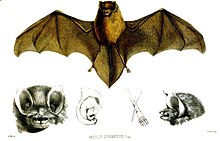| Natalus | |
|---|---|

| |
| Mexican funnel-eared bat (Natalus stramineus) | |
| Scientific classification | |
| Domain: | Eukaryota |
| Kingdom: | Animalia |
| Phylum: | Chordata |
| Class: | Mammalia |
| Order: | Chiroptera |
| Family: | Natalidae |
| Genus: | Natalus Gray, 1838 |
| Type species | |
| Natalus stramineus Gray, 1838 | |
| Species | |
|
See Text | |
The genus Natalus of funnel-eared bats is found from Mexico to Brazil and the Caribbean islands. They are slender bats with unusually long tails and, as their name suggests, funnel-shaped ears. They are small, at only 3.5 to 5.5 cm in length, with brown, grey, yellow, or reddish fur. Their tail is completely enclosed in the interfemoral membrane. Adult males have a natalid organ, a large glad-like organ, on the muzzle or face. Their skulls are delicate and extended. They have swollen, rounded braincase and narrow, somewhat tubular rostrum. They have nineteen teeth on both sides, with two upper and three lower being incisors, one upper and lower canine, three upper and lower premolars, and three upper and lower molars. Like many other bats, they are insectivorous, and roost in caves. The genus is similar to the Furipteridae and Thyropteridae genera. All three genera have mostly the same geographic ranges.
Eight species belong to this genus, with cranial and external differences:
| Name | Common name | Authority | Conservation status | Distribution | Reference |
|---|---|---|---|---|---|
| Natalus jamaicensis | Jamaican greater funnel-eared bat | Goodwin, 1959 | Critically Endangered | Jamaica | |
| Natalus major | Hispaniolan greater funnel-eared bat | Miller, 1902 | Near Threatened | Hispaniola | |
| Natalus mexicanus | Mexican greater funnel-eared bat | Miller, 1902 | Least Concern | Belize, Costa Rica, El Salvador, Guatemala, Honduras, Mexico, Nicaragua, and Panama | |
| Natalus primus | Cuban greater funnel-eared bat | Anthony, 1919 | Vulnerable | Cuba | |
| Natalus stramineus | Mexican funnel-eared bat | Gray, 1838 | Least Concern | Anguilla, Antigua, Barbuda, Dominica, Guadeloupe, Marie Galante, Martinique, Montserrat, Nevis, Saba | |
| Natalus tumidirostris | Trinidadian funnel-eared bat | Miller, 1900 | Least Concern | Northern Colombia, Venezuela, Guyana, French Guiana, Trinidad and Tobago, Curaçao, and Bonaire |
Etymology
The genus name Natalus is derived form the Latin word meaning "related to one's birth." The name was chosen because the bats of this genus are small and look like newborns even as adults.
References
- Wilson, D. E.; Reeder, D. M., eds. (2005). Mammal Species of the World: A Taxonomic and Geographic Reference (3rd ed.). Johns Hopkins University Press. ISBN 978-0-8018-8221-0. OCLC 62265494.
- Dalquest, Walter W. (1950). "The genera of the Chiropteran family Natalidae". Journal of Mammalogy. 31 (4): 436–43. doi:10.2307/1375114. JSTOR 1375114.
- Solari, S. (2016). "Natalus jamaicensis". IUCN Red List of Threatened Species. 2016: e.T136824A22043871. doi:10.2305/IUCN.UK.2016-1.RLTS.T136824A22043871.en. Retrieved 12 November 2021.
- Miller, B.; Reid, F. (2016). "Natalus major". IUCN Red List of Threatened Species. 2016: e.T136548A21992984. doi:10.2305/IUCN.UK.2016-2.RLTS.T136548A21992984.en. Retrieved 12 November 2021.
- Velazco, P. & Pineda, W. (2008). "Natalus mexicanus". IUCN Red List of Threatened Species. 2008: e.T136363A4280850. doi:10.2305/IUCN.UK.2008.RLTS.T136363A4280850.en.
- Mancina, C. (2016). "Natalus primus". IUCN Red List of Threatened Species. 2016: e.T136777A22032828. doi:10.2305/IUCN.UK.2016-1.RLTS.T136777A22032828.en. Retrieved 12 November 2021.
- Davalos, L.; Tejedor, A. (2016). "Natalus stramineus". IUCN Red List of Threatened Species. 2016: e.T14360A22040956. doi:10.2305/IUCN.UK.2016-3.RLTS.T14360A22040956.en. Retrieved 12 November 2021.
- Davalos, L.; Velazco, P.; Aguirre, L. (2016). "Natalus tumidirostris". IUCN Red List of Threatened Species. 2016: e.T14362A22041401. doi:10.2305/IUCN.UK.2016-3.RLTS.T14362A22041401.en. Retrieved 12 November 2021.
| Taxon identifiers | |
|---|---|
| Natalus | |